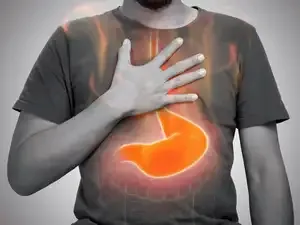Heartburn is among the most familiar digestive complaints, showing up after late dinners, spicy food, or even stressful days. But for some people, it becomes an ongoing issue that interferes with daily comfort. When this happens, many begin to wonder whether the problem is something simple, like gastroesophageal reflux disease (GERD), or something more alarming, such as esophageal cancer.
Since both conditions involve the same part of the body, it’s natural to feel anxious about the overlap. Understanding how these two conditions behave, and how their symptoms evolve, can help people know when to seek medical advice, as quoted in a report by TOI.
ALSO READ: Mixing these 5 common foods with Diabetes meds could be a big mistake, experts say avoid these
Gastroesophageal reflux disease occurs when stomach acid repeatedly flows upward into the esophagus. This acid is meant to stay in the stomach, so when it rises, it irritates the esophageal lining, creating the familiar burning sensation known as heartburn. GERD tends to flare after large meals, lying down too soon after eating, or consuming foods that irritate or relax the esophagus. These include spicy foods, tomatoes, citrus fruits, chocolate, and caffeinated drinks.
Common symptoms include a burning sensation in the chest after meals, a sour taste in the mouth, chronic coughing, throat clearing, hoarseness, and sometimes the feeling that food is rising back up. Although these symptoms can be uncomfortable and disruptive, GERD is generally manageable. Smaller meals, avoiding late-night eating, and identifying food triggers often provide relief. Acid-reducing medications can also make a significant difference, as quoted in a report by TOI.
ALSO READ: 5 whole grains dietitians swear by to improve Insulin resistance and balance blood sugar
Esophageal cancer arises when abnormal cells in the esophagus begin growing uncontrollably. Unlike GERD, this condition is rare, but it is far more serious. One of the challenges in treating esophageal cancer is that it often begins quietly. Early stages may show little to no symptoms, which makes it important to pay attention to changes that feel persistent or unusual.
Symptoms of esophageal cancer include difficulty swallowing, pain while swallowing, unexplained weight loss, and a sense that food is getting stuck on the way down. Some people may also experience ongoing chest discomfort. While these symptoms do not necessarily indicate cancer, they do require prompt medical evaluation to identify the cause, as quoted in a report by TOI.
ALSO READ: Leonid Meteor Shower Peaks: here's when and where should you watch the shooting stars tonight
According to research published in the National Institute of Health, “Gastroesophageal reflux disease was associated with a significantly increased risk of esophageal and laryngeal cancers.” The study also notes that “the observed lower risks of colorectal, liver and pancreatic cancer among individuals with GERD may be attributable to earlier detection and treatment of precancerous lesions resulting from more frequent healthcare utilisation.”
The findings were based on data from the National Health Insurance-National Health Screening Cohort, a randomly selected group representing 10% of screening participants from 2002–03, with individuals followed until 2015, as quoted in a report by TOI.
ALSO READ: Essential tips to prevent fatty liver: Foods to avoid and lifestyle changes for better liver health
As both conditions involve the esophagus, GERD and esophageal cancer share several similar symptoms, which can make distinguishing them difficult without medical evaluation. Both can cause chest discomfort. GERD discomfort often appears after eating and usually improves with antacids. In contrast, cancer-related discomfort is less likely to ease with typical heartburn remedies, as quoted in a report by TOI.
Swallowing issues also occur in both conditions. For GERD, swallowing problems often stem from inflammation and tend to come and go. In esophageal cancer, swallowing difficulty tends to progressively worsen over time, with many people shifting toward softer foods or drinking more water to help swallow.
Both conditions may cause sensations of food moving upward or not passing smoothly. GERD often leads to regurgitation due to acid movement, while cancer may create the feeling of food physically sticking. Throat irritation is also common in both, though for different reasons. GERD often causes morning hoarseness from nighttime reflux, whereas cancer-related throat discomfort may appear later in the disease process, as quoted in a report by TOI.
While the symptoms can look similar on the surface, the pattern and behavior of these symptoms usually reveal what’s going on. GERD symptoms tend to fluctuate, worse on some days, barely noticeable on others. They have clear triggers, such as heavy meals, lying down too soon, or eating irritating foods. GERD typically responds well to lifestyle adjustments and acid-reducing medications, as quoted in a report by TOI.
Esophageal cancer behaves very differently. Symptoms are persistent and often progressively worsen regardless of food choices or timing. Difficulty swallowing is one of the most important red flags because it rarely improves on its own. Unexplained weight loss is another warning sign that should prompt medical attention. Unlike GERD, symptoms related to cancer do not improve with common heartburn medications, as quoted in a report by TOI.
Most people with GERD will never develop esophageal cancer. However, long-term untreated GERD can lead to a condition called Barrett’s esophagus, in which the esophageal lining changes due to constant acid exposure. Barrett’s esophagus slightly increases the risk of esophageal cancer over many years, though it does not mean cancer will necessarily occur.
Because of this raised risk, many medical professionals recommend periodic check-ups for individuals diagnosed with Barrett’s esophagus. This ongoing monitoring helps detect any significant changes early, as quoted in a report by TOI.
Although GERD and esophageal cancer share several symptoms, they are fundamentally different disorders—one common and manageable, the other rare but serious. Paying attention to how symptoms behave over time can guide people toward timely diagnosis and proper treatment, ensuring better outcomes in both cases, as quoted in a report by TOI.
Note: This article is for informational purposes only and not a substitute for professional medical advice. Always consult your doctor regarding any medical concerns.
Do GERD and esophageal cancer have similar symptoms?
Yes. Both affect the esophagus and can cause chest discomfort and swallowing issues, but their patterns differ.
Does GERD increase cancer risk?
Long-term untreated GERD can lead to Barrett’s esophagus, which slightly raises the risk—but most GERD patients never develop cancer.
Since both conditions involve the same part of the body, it’s natural to feel anxious about the overlap. Understanding how these two conditions behave, and how their symptoms evolve, can help people know when to seek medical advice, as quoted in a report by TOI.
ALSO READ: Mixing these 5 common foods with Diabetes meds could be a big mistake, experts say avoid these
What exactly is GERD?
Gastroesophageal reflux disease occurs when stomach acid repeatedly flows upward into the esophagus. This acid is meant to stay in the stomach, so when it rises, it irritates the esophageal lining, creating the familiar burning sensation known as heartburn. GERD tends to flare after large meals, lying down too soon after eating, or consuming foods that irritate or relax the esophagus. These include spicy foods, tomatoes, citrus fruits, chocolate, and caffeinated drinks.
Common symptoms include a burning sensation in the chest after meals, a sour taste in the mouth, chronic coughing, throat clearing, hoarseness, and sometimes the feeling that food is rising back up. Although these symptoms can be uncomfortable and disruptive, GERD is generally manageable. Smaller meals, avoiding late-night eating, and identifying food triggers often provide relief. Acid-reducing medications can also make a significant difference, as quoted in a report by TOI.
ALSO READ: 5 whole grains dietitians swear by to improve Insulin resistance and balance blood sugar
How does esophageal cancer begin?
Esophageal cancer arises when abnormal cells in the esophagus begin growing uncontrollably. Unlike GERD, this condition is rare, but it is far more serious. One of the challenges in treating esophageal cancer is that it often begins quietly. Early stages may show little to no symptoms, which makes it important to pay attention to changes that feel persistent or unusual.
Symptoms of esophageal cancer include difficulty swallowing, pain while swallowing, unexplained weight loss, and a sense that food is getting stuck on the way down. Some people may also experience ongoing chest discomfort. While these symptoms do not necessarily indicate cancer, they do require prompt medical evaluation to identify the cause, as quoted in a report by TOI.
ALSO READ: Leonid Meteor Shower Peaks: here's when and where should you watch the shooting stars tonight
What does current research say?
According to research published in the National Institute of Health, “Gastroesophageal reflux disease was associated with a significantly increased risk of esophageal and laryngeal cancers.” The study also notes that “the observed lower risks of colorectal, liver and pancreatic cancer among individuals with GERD may be attributable to earlier detection and treatment of precancerous lesions resulting from more frequent healthcare utilisation.”
The findings were based on data from the National Health Insurance-National Health Screening Cohort, a randomly selected group representing 10% of screening participants from 2002–03, with individuals followed until 2015, as quoted in a report by TOI.
ALSO READ: Essential tips to prevent fatty liver: Foods to avoid and lifestyle changes for better liver health
When do the symptoms start to overlap?
As both conditions involve the esophagus, GERD and esophageal cancer share several similar symptoms, which can make distinguishing them difficult without medical evaluation. Both can cause chest discomfort. GERD discomfort often appears after eating and usually improves with antacids. In contrast, cancer-related discomfort is less likely to ease with typical heartburn remedies, as quoted in a report by TOI.
Swallowing issues also occur in both conditions. For GERD, swallowing problems often stem from inflammation and tend to come and go. In esophageal cancer, swallowing difficulty tends to progressively worsen over time, with many people shifting toward softer foods or drinking more water to help swallow.
Both conditions may cause sensations of food moving upward or not passing smoothly. GERD often leads to regurgitation due to acid movement, while cancer may create the feeling of food physically sticking. Throat irritation is also common in both, though for different reasons. GERD often causes morning hoarseness from nighttime reflux, whereas cancer-related throat discomfort may appear later in the disease process, as quoted in a report by TOI.
How do these differences matter?
While the symptoms can look similar on the surface, the pattern and behavior of these symptoms usually reveal what’s going on. GERD symptoms tend to fluctuate, worse on some days, barely noticeable on others. They have clear triggers, such as heavy meals, lying down too soon, or eating irritating foods. GERD typically responds well to lifestyle adjustments and acid-reducing medications, as quoted in a report by TOI.
Esophageal cancer behaves very differently. Symptoms are persistent and often progressively worsen regardless of food choices or timing. Difficulty swallowing is one of the most important red flags because it rarely improves on its own. Unexplained weight loss is another warning sign that should prompt medical attention. Unlike GERD, symptoms related to cancer do not improve with common heartburn medications, as quoted in a report by TOI.
Can GERD lead to esophageal cancer?
Most people with GERD will never develop esophageal cancer. However, long-term untreated GERD can lead to a condition called Barrett’s esophagus, in which the esophageal lining changes due to constant acid exposure. Barrett’s esophagus slightly increases the risk of esophageal cancer over many years, though it does not mean cancer will necessarily occur.
Because of this raised risk, many medical professionals recommend periodic check-ups for individuals diagnosed with Barrett’s esophagus. This ongoing monitoring helps detect any significant changes early, as quoted in a report by TOI.
When should someone consult a healthcare professional?
It’s important to seek medical evaluation if heartburn occurs more than once a week. While symptoms vary from person to person, signs like unexplained weight loss, persistent chest discomfort, or lack of response to typical heartburn remedies warrant further investigation.Although GERD and esophageal cancer share several symptoms, they are fundamentally different disorders—one common and manageable, the other rare but serious. Paying attention to how symptoms behave over time can guide people toward timely diagnosis and proper treatment, ensuring better outcomes in both cases, as quoted in a report by TOI.
Note: This article is for informational purposes only and not a substitute for professional medical advice. Always consult your doctor regarding any medical concerns.
FAQs
Do GERD and esophageal cancer have similar symptoms?
Yes. Both affect the esophagus and can cause chest discomfort and swallowing issues, but their patterns differ.
Does GERD increase cancer risk?
Long-term untreated GERD can lead to Barrett’s esophagus, which slightly raises the risk—but most GERD patients never develop cancer.








